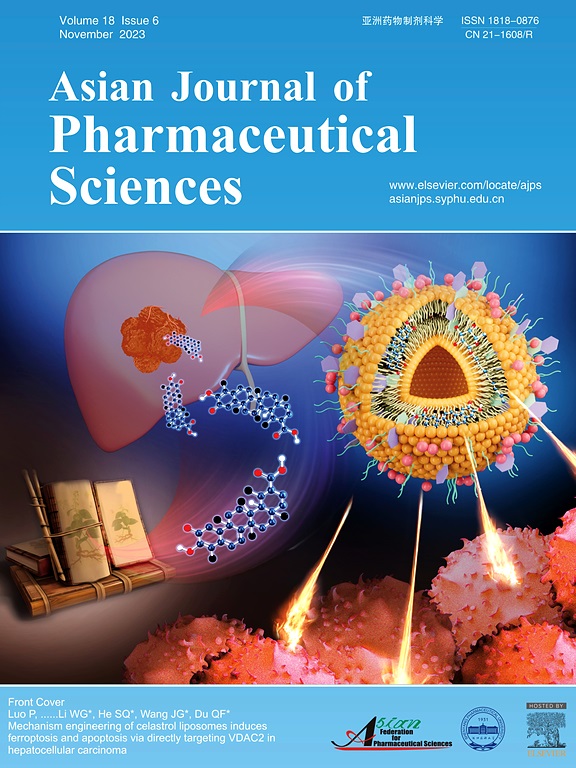Tailoring carrier-free nanoparticles based on natural small molecule assembly for synergistic anti-tumor efficacy
IF 11.9
1区 医学
Q1 PHARMACOLOGY & PHARMACY
引用次数: 0
Abstract
Interfacial modular assemblies of versatile polyphenols have attracted widespread interest in surface and materials engineering. In this study, natural polyphenol (tannic acid, TA) and nobiletin (NOB) can directly form binary carrier-free spherical nanoparticles (NT NPs) through synergistically driven by a variety of interactions (such as hydrogen bonding, oxidative reactions, etc.). The synthesis involves polyphenolic deposition on hydrophobic NOB nanoaggregates, followed by in situ oxidative self-polymerization. Interestingly, the assembled NT NPs exhibit controllable and dynamic changes in particle size during the initial stage. Ultimately, uniform and spherical NT NPs appear stable, with high loading capability, enabling incorporated NOB to preserve their function. Furthermore, in vitro evaluations demonstrate that the rational combination of polyphenol module and NOB can induce apoptosis and inhibit tumor metastasis for both lung cancer H1299 and human fibrosarcoma HT1080 cell lines. Notably, the optimized NT48 NPs were then verified in vivo experiments to achieve a promising synergistic anti-tumor efficacy. These findings not only provide new opportunities for the streamlined and sensible engineering of future polyphenol-based biomaterials, but also open up new prospects for the design of small-molecule nature phytochemicals.

基于天然小分子组装的裁剪无载体纳米颗粒协同抗肿瘤功效
多酚类化合物的界面模块化组装在表面和材料工程领域引起了广泛的关注。本研究中,天然多酚(单宁酸,TA)与皂素(NOB)在多种相互作用(如氢键、氧化反应等)的协同驱动下,可直接形成二元无载流子球形纳米颗粒(NT NPs)。合成过程包括在疏水NOB纳米聚集体上沉积多酚,然后进行原位氧化自聚合。有趣的是,组装的NT NPs在初始阶段表现出可控和动态的粒径变化。最终,均匀和球形的NT NPs看起来稳定,具有高负载能力,使加入NOB能够保持其功能。此外,体外实验表明,多酚模块与NOB的合理组合对肺癌H1299和人纤维肉瘤HT1080细胞系均具有诱导凋亡和抑制肿瘤转移的作用。值得注意的是,优化后的NT48 NPs在体内实验中得到了验证,具有很好的协同抗肿瘤功效。这些发现不仅为未来基于多酚的生物材料的流线型和可感知工程提供了新的机会,而且为小分子天然植物化学物质的设计开辟了新的前景。
本文章由计算机程序翻译,如有差异,请以英文原文为准。
求助全文
约1分钟内获得全文
求助全文
来源期刊

Asian Journal of Pharmaceutical Sciences
Pharmacology, Toxicology and Pharmaceutics-Pharmaceutical Science
CiteScore
18.30
自引率
2.90%
发文量
11
审稿时长
14 days
期刊介绍:
The Asian Journal of Pharmaceutical Sciences (AJPS) serves as the official journal of the Asian Federation for Pharmaceutical Sciences (AFPS). Recognized by the Science Citation Index Expanded (SCIE), AJPS offers a platform for the reporting of advancements, production methodologies, technologies, initiatives, and the practical application of scientific knowledge in the field of pharmaceutics. The journal covers a wide range of topics including but not limited to controlled drug release systems, drug targeting, physical pharmacy, pharmacodynamics, pharmacokinetics, pharmacogenomics, biopharmaceutics, drug and prodrug design, pharmaceutical analysis, drug stability, quality control, pharmaceutical engineering, and material sciences.
 求助内容:
求助内容: 应助结果提醒方式:
应助结果提醒方式:


